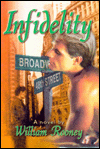 |

 |
|
Jesse Monteagudo's Book Nook
'The Sex Squad' & 'Infidelity'
 In My Worst Date, Miami Beach resident David Leddick wrote
about gay life in South Beach. For The Sex Squad, his second novel, Leddick
drew upon another set of experiences, as a dancer in New York's Metropolitan
Opera during its Golden Age.
In My Worst Date, Miami Beach resident David Leddick wrote
about gay life in South Beach. For The Sex Squad, his second novel, Leddick
drew upon another set of experiences, as a dancer in New York's Metropolitan
Opera during its Golden Age.
During the 1950s New York's ballet scene was in ferment, and many talented dancers branched out into opera, Broadway shows, movie musicals, television and other outlets for their talents. It was also a hotbed of homosexuality, as young gay men, who would have been closeted in other careers, flourished in the dance world's traditionally-tolerant atmosphere. One such young gay man was Harry Potter. Introduced to the dance by his stage-struck mother, Harry discovered that he had the looks and affinity for the art. More importantly, the ballet was a milieu that accepted Harry's newly-discovered sexual orientation.
Being part of the "sex squad" would guarantee a dancer all the sex that he can handle, and both Illy and Rex took advantage of this privilege. Rex went even further, moonlighting as a model for the "Tie Catalog", a discreet call-boy service provided by Mulroney and Weaver ("the smart men's haberdasher on East Fifty-seventh Street"). But Harry is too prim to take advantage of his perk and too naive to realize that love and lust don't always mix. His love affairs with Illy and Rex are doomed to failure, if only because all three men are too selfish and self-centered to sustain a relationship. In a classic case of tit for tat, Harry begins an affair with Rex behind Illy's back, only to find out that Rex is cheating on his own - with Illy! And when Harry spurns the advances of the Met's powerful choreographer, his career as a dancer is over. As a gay love story, The Sex Squad is mediocre. What we enjoy most about the book is Leddick's memories of life in the ballet during its heady heyday. Though Harry Potters's - and David Leddick's - dancing days are over, both men still look back fondly to the days when they pranced across the stage at the Met. To Harry/David, dancing is "the perfect art. Consuming itself as it happens. Leaving you only with the feeling of having seen . . . or felt . . . moments of actually doing what you once only dream of doing." Dancing was like falling in love and Harry, having lost at both, turned his back on both. His life was a waste, which fortunately for us is not the case with this book. Infidelity: A Novel by William Rooney; Harrington Pleasure Press; 214 pages; $24.95.
 For its first foray into gay fiction, Harrington Park
Press chose another fictional memoir. William Rooney - airman, actor,
bartender, writer - went back to his dramatic past for this tale of no love
lost among the theater folk of the 1960s.
For its first foray into gay fiction, Harrington Park
Press chose another fictional memoir. William Rooney - airman, actor,
bartender, writer - went back to his dramatic past for this tale of no love
lost among the theater folk of the 1960s.
Tom Clifden, a "Kennedyesque"-handsome actor, meets Hank Carter when the two young men audition for a play. Carter, fresh from Terre Haute, Indiana, is living with a woman, Eunice, but soon drops her for the fascinating Clifden. I am sure I won't surprise anyone when I write that Hank and Tom do not succeed as lovers. They are sexually incompatible - "Hank's attitude seemed to be that our apartment was a forest and he was one of God's furry little creatures, while I was the hungry predator. Which could have been fun if not for the fact that it was the chase itself that he most enjoyed" - and, even worse, emotionally incompatible. Before long Tom and Hank go their separate ways, accentuated by personal spats and the infidelities that give this book its title. If Rooney's description of theatrical life in the sixties was half as good as Leddick's description of ballet life in the fifties, Infidelity might have been worth reading. But this is not the case. Rooney's descriptions of life on the road - with its attendant hanky-panky - and lecherous producers are real enough to give his book some authenticity, but not enough to liven up a rather limp narrative. Looking back from the present, Tom wonders how he could have made his relationship with Hank work. It was a lost cause from the start. BOOK NOOK NEWS: I recently wrote a piece about homosexuality in animals. Unfortunately for me, I wrote it before the publication of Biological Exuberance: Animal Homosexuality and Natural Diversity by Bruce Bagemihl (St. Martin's Press; $40.00). Bagemihl's ten years of research resulted in fascinating revelations, which earned the book headlines in both queer and mainstream publications. His descriptions of "male gorillas courting and copulating with each other . . . grizzly bear families with two mothers . . . [and] same-sex pairs of flamingos", among others, are enough to give Jerry Falwell a fit. Biological Exuberance provides "an affirmation of life's vitality and infinite possibilities: a worldview that is at once primordial and futuristic, in which gender is kaleidoscopic, sexualities are multiple and the categories of male and female are fluid and transmutable." |
 © 1997-99 BEI
© 1997-99 BEI